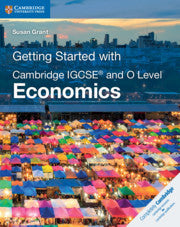Getting Started with Cambridge IGCSE™ and O Level Economics

Getting Started with Cambridge IGCSE™ and O Level Economics
Author: Susan Grant
Format: Paperback
Subject: Economics
Qualification: Cambridge IGCSE / O Level
Available from: November 2018
Product Description:
Support learners in building a strong foundation in economic thinking with the Cambridge IGCSE® and O Level Economics Workbook, designed for the Cambridge IGCSE (0455) and O Level (2281) syllabuses for first examination from 2020.
This engaging workbook explores real-world questions—like why some products are more expensive, how wages are determined, and what causes poverty. Students will practise key economic concepts through individual and group activities that promote critical thinking, decision-making, and personal connection to the subject.
Perfect for use alongside the coursebook, this resource offers extra practice and can also serve as pre-course preparation or summer work before formal study begins. Answers are provided at the back, allowing for independent study or flexible classroom use.
Key Features:
Aligned with Cambridge IGCSE (0455) and O Level (2281) Economics syllabuses
Encourages learners to explore real-world economic questions and scenarios
Develops skills in judgement, analysis, and application
Suitable for group or independent activities
Can be used for classroom learning, revision, or summer prep
Includes answer key for self-assessment and review
A valuable resource to help students deepen their understanding and apply economics to the world around them.


